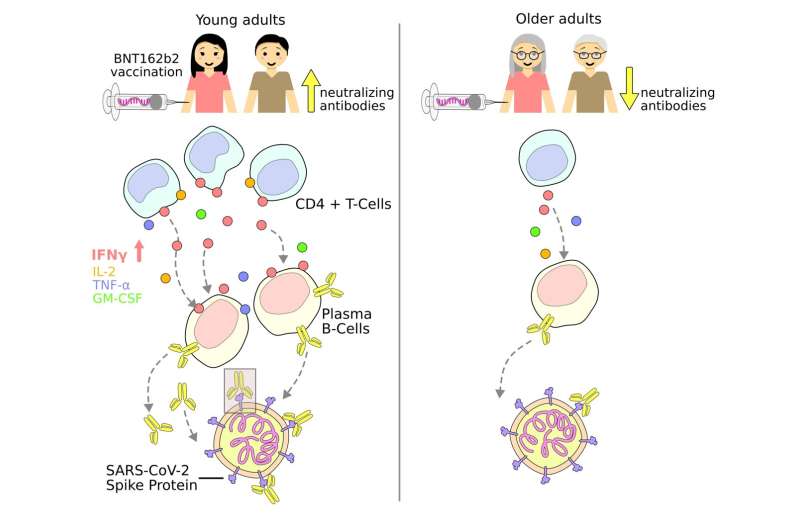This article has been reviewed according to Science X's editorial process and policies. Editors have highlighted the following attributes while ensuring the content's credibility:
fact-checked
peer-reviewed publication
trusted source
proofread
Relative deficiency in immune cells can account for poorer vaccination responses in the older population

As we age, the immune system's efficacy weakens, leading to less effective defenses against new pathogens—such as the SARS-CoV-2 virus. How immunosenescence in older adults affects their immune response to COVID-19 mRNA vaccinations is poorly understood and is an active area of study.
A study led by Dr. Vanda Ho, a Ph.D. student at the Department of Microbiology and Immunology, and Immunology and Infectious Diseases Translational Research Programmes at the Yong Loo Lin School of Medicine, National University of Singapore (NUS Medicine), aimed to examine the impact of age on immune response after two doses of the COVID-19 mRNA Pfizer vaccination. She is also an Associate Consultant in the Division of Geriatric Medicine under the Department of Medicine at the National University Hospital (NUH).
A collaborative effort with researchers from the Division of Infectious Diseases under the Department of Medicine at NUH, the A*STAR Infectious Diseases Labs (A*STAR ID Labs), and the National Centre for Infectious Diseases (NCID), the study was focused on T cells, which are immune cells that help protect the body from infection. T cells play a crucial role in fighting some cancers and are most affected by increasing age. The study has been published in Aging Cell.
Fifteen younger individuals, with a median age of 31 years old, and 14 older individuals, with a median age of 72 years old, took two doses of the COVID-19 mRNA Pfizer vaccination and were followed up for three months. Blood tests were taken during the pre-vaccination (day 0), after one dose of vaccination (day 28), and after both doses (day 100). The blood samples were analyzed for SARS-CoV-2 neutralization and changes in immune cell subsets over time.
Overall, older adults had weaker T cell responses to the vaccination, resulting in poorer antibody responses and SARS-CoV-2 immune protection. The study team found that a specific type of T cells—interferon-gamma (IFNγ)-secreting CD4+ T cells—demonstrated a strong positive correlation to the effectiveness of vaccine response in younger adults. However, older adults had fewer of these immune cells and did not display the same positive correlation and vaccine response as the younger adults.
This suggests that older adults may have a relative deficiency in this important T cell, which could explain their poorer vaccination response. As weakened immune responses in the older population could lead to breakthrough infections, the findings support the importance of additional booster doses for older adults.
The study's findings hold important clues in the understanding of our aged immune system, as the team seeks to examine if this particular T cell plays similarly important roles in other infections, such as COVID-19 and latent tuberculosis infections.
"Our next steps would be to explore the underlying mechanisms to see how this T cell population interacts with the rest of the immune system. By improving our understanding of age-differentiated vaccination response, we can develop novel interventions to augment our immune responses, improve infection outcomes, and ultimately, increase health span in our older adults."
"We are immensely grateful to the volunteers who have participated in our study and would like to thank them for their pivotal role in advancing our understanding of the aging immune system," said Dr. Ho, co-first author of the study.
More information: Vanda W. T. Ho et al, Relative deficiency in interferon‐γ‐secreting CD4+ T cells is strongly associated with poorer COVID‐19 vaccination responses in older adults, Aging Cell (2024). DOI: 10.1111/acel.14099





















